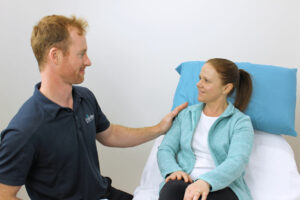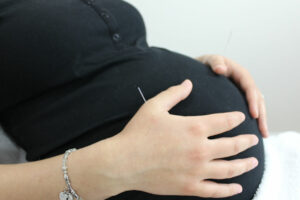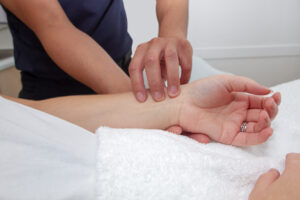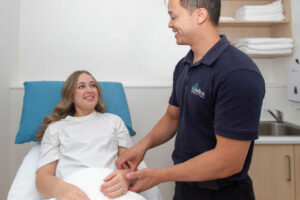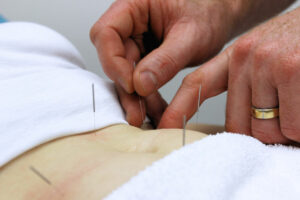Naturally improving fertility outcomes is a topic that we are passionate about and when it comes to fertility, it takes two to tango. For couples that are trying to conceive a healthy pregnancy, it’s essential to consider both the male and female’s state of health and fertility equally!
We find that far too often men are not paid as much attention to when it comes to assessing fertility when in fact, in cases of infertility, studies show that up to 45% of the time male infertility is a factor in couples experiencing fertility issues.
Specifically in this blog I will be covering:
- The factors that contribute to male infertility – sperm count is a big one but only part of the bigger picture!
- Natural lifestyle modifications that you can do at home to improve male fertility
- Treatment options that we offer at our clinic to assess your situation and boost fertility outcomes
The Cause of Male Infertility
There are various factors that may be contributing to male infertility and as mentioned, sperm count is just a part of the situation!
Not Being Able to Ejaculate & Erection Issues
If a man is unable to ejaculate or there isn’t enough volume (2ml is average, about half a teaspoon or so) then this may have a large impact on fertility outcomes.
Being able to achieve a solid erection is essential to penetrate the vagina and ejaculate the sperm in the right direction. This is fundamental when it comes to natural conception for couples.
Sperm
Sperm analysis is a large area to investigate to better understand male fertility. Sperm are analysed in terms of:
- Sperm Count which is a measure of how many sperm are in each mil of ejaculate. A normal number is around 20,000,000 sperm per mil or higher. However, it’s common for men with lower sperm counts than this to achieve fertility and for men with sperm counts as high as 200,000,000 to have issues with fertility.
- Sperm Motility is the percentage of sperm that are moving and swimming. It’s normal for 50% of sperm to be moving in a sperm analysis. This is a high number but is realistic because each day millions of sperm is produced and dying.
- Sperm Morphology which is the shape of the overall sperm – whether the head is pointy enough to penetrate the egg, the neck and body/tail are robust enough to reach the egg.
Natural Lifestyle Modifications to Improve Male Fertility
Lifestyle plays an enormous role in our overall health and is fundamental to improving fertility outcomes either with or without help from a healthcare professional.
Diet
Generally speaking, foods that are good for male health are also good for sperm health!
- Dark leafy vegetables contain lots of antioxidants. As sperm are fragile and prone to oxidative stress, increasing antioxidants in the body through increasing intake of fresh fruit and vegetables will decrease oxidative stress leading to more high-quality sperm.
- Polyunsaturated fats make up the bulk of the head of sperm. It’s not clearly shown that by increasing intake of foods such as walnuts, chia seeds and fish that this will lead to these fats being distributed in sperm. However, it is known that these types of fat lead to an improvement in men’s health which is ultimately great for fertility health!

Exercise
To be effective, exercise must be on a regular basis – more than 1-2x/week. Exercising at least 4 – 5x a week is great and may include any type of exercise such as walking, yoga, running, riding, and swimming.
Exercise also decreases stress, improves metabolism, and assists with weight loss which plays a considerable role in fertility enhancement both through hormonal regulation and decreasing pressure and temperature of the testes.
Sleep
When it comes to fertility, sleep decreases stress and allows the pituitary gland to recharge. The pituitary gland controls hormonal regulation and therefore has a direct correlation with sperm production.
Sleeping more than 6 hours a night is essential to help decrease stress and cortisol levels, stimulate weight loss, and optimise sperm production and fertility enhancement.
Natural Treatment Options That Help
If you have already been through lifestyle modifications, there are natural and non-invasive treatment options that can help!

Acupuncture
Acupuncture is a powerful treatment technique that can be used to address some of the causative factors related to male fertility. As we know, addressing the causative factors of any health issue is a pro-active means to achieve long lasting results.
Erectile Dysfunction & Failure to Ejaculate
Mental health concerns have been shown in systematic reviews to be a significant contributing factor for both erectile dysfunction and failure to ejaculate. Many studies have shown that Acupuncture has been useful to decrease stress and anxiety in males to improve overall mental health. Given this, Acupuncture represents a safe and effective means to address the causative factor of each of these fertility issues.
Sperm Morphology, Motility and Quantity
Oxidative stress is an essential change that can be identified in many diseases and is related to decreased sperm quantity and quality (morphology and motility). Through its effect on various pathways, Acupuncture has been shown in research to have an antioxidant effect in diseases where oxidative stress plays a role. In the case of sperm morphology, motility and quantity which are related to oxidative stress, Acupuncture may be used as a proactive approach to reduce oxidative stress and improve fertility parameters.
Supplements
Many women take prenatal vitamins to improve fertility outcomes, so why shouldn’t men?
There are many studies on how supplements can have an effect to improve sperm count, morphology and motility. There are many combined fertility supplements on the market that typically include:
- Folic Acid
- Selenium
- Co-Q10
- L-Carnitine
- Zinc
Overlooked Fundamentals Of Intercourse
When to Have Sex
A big part of fertility for couples is knowing WHEN to have intercourse – a woman has 1 period of a few days each month that they can fall pregnant. There are great applications out there that can be used to predict this time period, as well as using ovulation tracking kits and Basal Body Temperature monitoring in conjunction with this. Beyond this, the man should always pay attention to the woman-she will be more in-tune to her biological clock and understand when her peak ovulatory time is.
How to Have Sex
Regarding optimum intercourse, it’s not relevant HOW intercourse is conducted but more importantly once the man ejaculates, the pelvis should be tilted up to utilise gravity for the sperm to move towards the egg. In the scheme of things, sperm must travel a LONG way to fertilise the egg. Proportionally, the distance that a sperm travels to reach the egg is for us more than 200km. So, utilising gravity to make the journey a downhill descent makes a substantial difference in improving fertility. Having the female spend 20 minutes with the pelvis tilted up is highly recommended to improve fertility outcomes.

When Should You See a Healthcare Professional?
There is an old belief that couples that are trying to conceive and not falling pregnant should keep trying for 12 months before they reach out for help. The reality is that if you have been trying to conceive for 6 months at appropriate times and not achieving a successful pregnancy, that not much other than frustration will happen over the next 6 months.
Most healthcare professionals in the field recommend that you seek help at either the 6 month mark, whenever you are uncertain, or if you are having difficulty.
Conclusion
Male fertility is a commonly overlooked aspect of fertility for couples and is a common cause for decreased fertility outcomes. Male fertility can be improved through both lifestyle modifications and treatments that healthcare professionals can provide.
In order to achieve the best outcomes for your health, as always, we recommend speaking to a healthcare professional. In many cases, there may be multiple issues contributing to infertility and your healthcare professional is the best person to effectively assess and advise the most appropriate course of action for your situation.
I hope that helps shed some light on the topic! If you would like to learn if we can help you, please call our friendly team on (02) 4709 6727.


